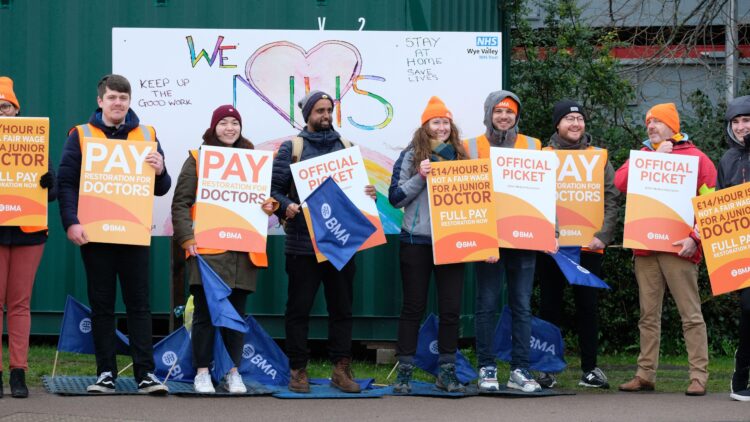By David Young-
Thousands of junior doctors are going on strike, days after starting their first NHS jobs.
The latest strikes from British Medical Association (BMA) junior doctors began at 7am on Friday and will end at 7am next Tuesday. It could result in the total number of appointments cancelled due to NHS industrial action hitting 1m.
Junior doctors from the British Medical Association (BMA) have so far taken 16 days of industrial action
Health Secretary Steve Barclay said that the strikes were diverting “significant amounts of money” away from front-line services and have led to the cancellation of countless operations and consultations.
Most of the 835,000 appointments have been postponed since industrial action began in December.
But NHS Confederation said the true level of disruption is being “masked” and the number of cancellations could be double this figure.
Foundation year 1 doctors started their first roles after medical school nine days ago, on 2 August, and will now strike for four days amid the bitter dispute with the government over pay.
The strike action comes less than 24 hours after figures revealed the waiting list of people awaiting treatment had climbed to a record high of 7.6 million. With consultants also striking again for two days in a fortnight’s time, the drive to tackle the care backlog will be further derailed.
More than 830,000 appointments have already been postponed as a result of industrial action since December, which is estimated to have cost the NHS about £1bn.
Sir Julian Hartley, the chief executive of NHS Providers, said cancellations could hit a million after strikes by junior doctors and consultants in August. “Trust leaders are very worried about six more days of severe disruption across the NHS this month. We could be close to a tipping point.
“Trusts and staff are pulling out all the stops to reduce waiting times for patients but with no end to strikes in sight the sheer volume of planned treatment being put back due to industrial action will make it almost impossible for trusts to cut waiting lists as much as the government wants.”
Rishi Sunak has promised to cut NHS waiting times. At the same time he has also insisted no more pay negotiations with junior doctors will take place. The prime minister said the deal was the “final offer” and there would be “no more talks on pay”.
The NHS Confederation has called the government’s “business as usual” approach to strike action “dangerous” and urged it to reopen talks with doctors.
Dr Robert Laurenson and Dr Vivek Trivedi, co-chairs of the BMA’s junior doctors committee, said: “We are now at the stage where a whole new cohort of junior doctors is entering the profession, only to be immediately given no choice by the government but to go on strike for their future. The government should be ashamed that this is the state of the profession they are presenting to our newest doctors.
“If they want a health service that retains this talent for decades to come, they need to come to the table – not in weeks, not in months, but today. This dispute should never have gone on so long.”
They added that the BMA’s “door remains open for talks at any time” with the government.H
Health Secretary Steve Barclay said: “Patients are bearing the brunt of the impact of continuous strikes across the NHS, and further action by the BMA will cause more appointments and procedures to be postponed.
“Our award balances the need to keep inflation in check while recognising the incredibly important work they do.
“My door is always open to discuss how to improve doctors’ working lives, but this pay award is final so I urge the BMA to end its strikes immediately.”
The BMA are demanding a 35% increase, arguing junior doctors have lost more than a quarter of their pay over 15 years as a result of salaries not keeping up with inflation.
But the government said a 6% uplift given to junior doctors, which it says is the equivalent to an average increase of 8.8% – in addition to a consolidated £1,250 rise – is “fair and reasonable”.
The Department of Health and Social Care said the pay rise given to junior doctors – a 6% increase along with an additional consolidated £1,250, which the government describes as an “average increase of around 8.8%” – was “fair and reasonable” and “above what most in the public and private sectors are receiving”.
NHS England has urged the public to continue to use 999 for life-threatening emergencies and 111 online for anything non-urgent. GPs and pharmacies are also open and largely unaffected by strikes. Patients should attend appointments as usual unless they had been rescheduled, it said.




